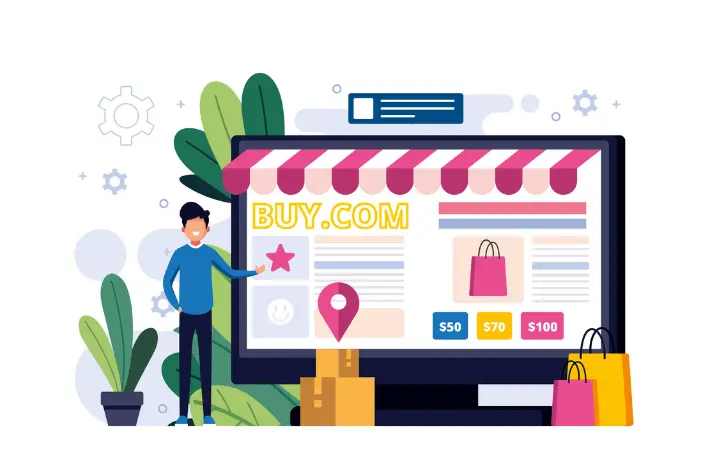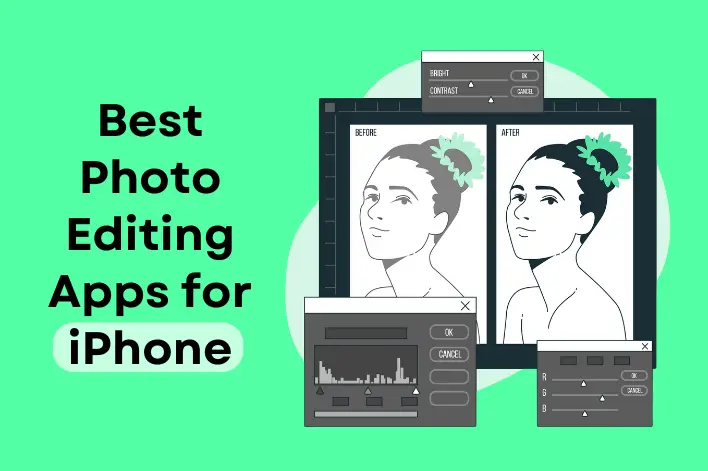The freelance marketplace is experiencing a remarkable surge, driven by the changing dynamics of the global workforce. The global freelance platforms market was valued at USD 4.39 billion in 2022 and is projected to expand at a compound annual growth rate (CAGR) of 16.5% from 2023 to 2030.
This rapid growth is not just a short-term trend but reflects a fundamental shift in how businesses hire talent and how professionals prefer to work.
Several factors contribute to this boom, making it an opportune time to build a marketplace website or app like Upwork.
First, remote work and flexibility have become the new standard. With companies recognizing the benefits of accessing a global talent pool, traditional employment models are evolving.
Second, the rise of digital transformation has fueled the need for freelancers in technology, marketing, content creation, and other digital services.
Moreover, millions of professionals are seeking more control over their work-life balance, pushing them towards freelancing.
This cultural shift is reflected in the growing number of freelancers joining platforms like Upwork, Fiverr, and Freelancer.com.
Given these dynamics, the freelance marketplace industry is still strong. The increased demand for flexible work arrangements and the growing reliance on freelance services make it an ideal time for entrepreneurs to enter the space.
This guide provides an in-depth roadmap for developing your freelance marketplace, exploring its key advantages, essential features, development costs, and more.
By the end, you’ll clearly understand how to build a successful marketplace that can thrive in this booming market.
What is a Freelance Marketplace and How Does it Work?
A Freelancer Marketplace Solution is an online platform that connects freelancers with businesses or individuals who need specific services. These services range from web development, graphic design, and writing to consulting and digital marketing.
Freelance marketplaces streamline the hiring process by providing tools that help clients post jobs, review proposals, and manage projects all in one place.
Here’s a simplified breakdown of how a freelance marketplace works:
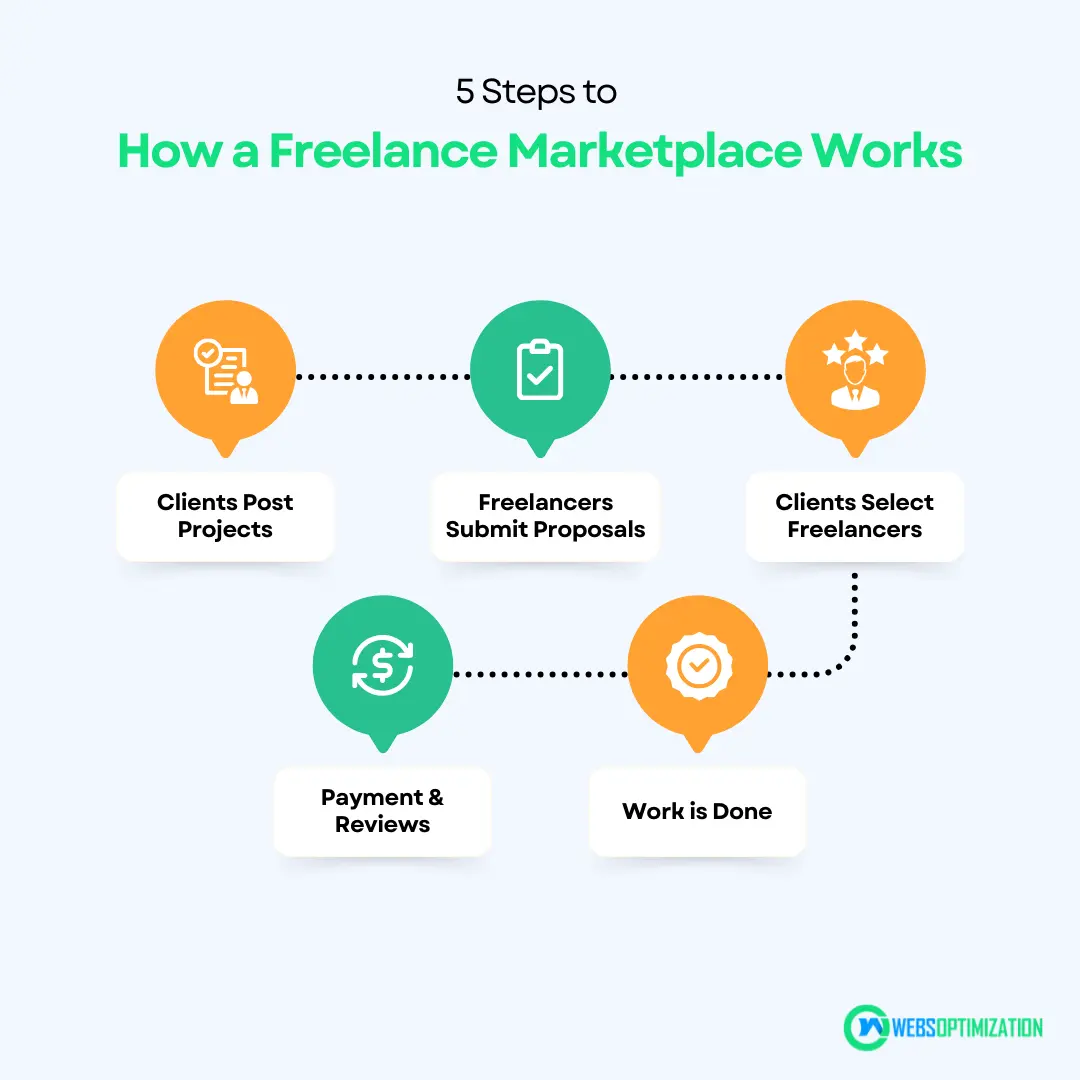
Clients post projects: Businesses or individuals list their job requirements, budget, and deadlines.
Freelancers submit proposals: After reviewing the job posting, freelancers submit proposals that include their price, timeline, and previous work experience.
Clients select freelancers: The client reviews proposals, checks freelancer profiles, and selects the best match.
Work is done: Once a freelancer is hired, they begin the work and provide updates through the platform’s communication tools.
Payment and reviews: After completing the project, payment is made through the platform, and both parties can leave reviews.
These platforms typically charge a commission on transactions, offering clients and freelancers a secure and streamlined process.
Advantages of Freelance Marketplace
Before diving into how to build a freelance marketplace, it’s important to understand why these platforms are so successful and why they attract millions of users worldwide. Some of the key advantages include:
Access to a global talent pool: Freelance marketplaces allow businesses to tap into a diverse, global workforce. Whether a company needs a one-time project or long-term assistance, it can easily find the right expert.
Cost-effective for businesses: Hiring freelancers is often more affordable than bringing in full-time employees, especially for short-term or project-based work. Freelancers can set their rates, allowing businesses to work within their budgets.
Convenience and flexibility for freelancers: Freelancers can set their working hours, choose the projects they want, and work from anywhere in the world. This flexibility attracts a large number of skilled professionals.
Transparent reviews and ratings: Platforms like Upwork offer a transparent rating system, making it easier for clients to select quality freelancers based on previous reviews and for freelancers to find reputable clients.
Secure payments and dispute resolution: Freelance marketplaces ensure that payments are held in escrow until the work is satisfactorily completed. This offers a level of security for both clients and freelancers. Additionally, these platforms often provide dispute-resolution mechanisms.
How to Build a Website or App like Upwork?
To create an online marketplace similar to Upwork, it's essential to understand the key components of a successful online marketplace platform. Begin by defining your niche; whether it's a b2c marketplace or a multi-vendor marketplace, having a clear target audience will guide your marketplace project.
Using an intuitive website builder or an online marketplace builder, you can start to build your marketplace from scratch.

Next, focus on marketplace application development to enhance accessibility. A dedicated mobile app can significantly boost user engagement and increase marketplace growth.
As a marketplace owner, you must prioritize build trust among users through effective communication, secure payment options, and robust customer support.
Finally, consider integrating features that allow users to easily set up their online store within your platform. This not only enriches your ecommerce marketplace but also encourages seller participation, leading to a vibrant community.
With the right strategies and tools, you can successfully build a marketplace platform that caters to the needs of both service providers and clients, ultimately driving the success of your marketplace creation.
Creating a thriving online marketplace requires careful planning, development, and marketing.
Here’s a step-by-step guide to help you get started:
1. Market Research and Niche Selection
Identify your target audience and the freelance services you want to offer.
Will your platform cater to a specific industry, like tech, writing, or marketing? Or will it be a general freelance marketplace like Upwork?
Conduct thorough research to understand your competitors, potential users, and market demand.
2. Define Your Business Model
There are various monetization models for freelance marketplaces, including:
- Commission-based: Charging a percentage of each completed transaction.
- Subscription-based: Offering premium membership plans for freelancers or clients for additional features.
- Freemium model: Offering essential services for free while charging for advanced features.
Choose a model that aligns with your revenue goals and user expectations.
3. Choose the Right Platform and Technology Stack
Decide whether to build your platform from scratch, use an existing CMS, or opt for marketplace development frameworks. Some popular technology stacks include:
- Backend: Node.js, Django, Ruby on Rails
- Frontend: React.js, Angular, Vue.js
- Database: MySQL, PostgreSQL, MongoDB
You’ll also need to choose a cloud provider like AWS, Google Cloud, or Azure to host your marketplace.
4. Design and Development
Focus on creating a user-friendly and intuitive design for clients and freelancers. You’ll need a seamless onboarding process, a precise job posting mechanism, and easy navigation for finding and selecting freelancers.
During the development phase, your team will build the core functionalities, including:
- User profiles for both freelancers and clients
- Job posting and proposal submission workflows
- Payment gateways for secure transactions
- Chat or messaging systems for client-freelancer communication
- Project management and progress tracking tools
5. Testing and Launch
Before launching, thoroughly test your platform for bugs, glitches, and user experience issues. Ensure that the website or app functions smoothly on various devices and browsers. Once confident, proceed with a beta launch to gather feedback and make necessary improvements.
6. Marketing and Growth
Once your platform is live, you’ll need a marketing strategy to attract freelancers and clients. Utilize SEO, social media marketing, and paid ads to reach your target audience. Offering incentives like referral bonuses can also help boost early growth.
Top Features Included in the Website or App like Upwork
Developing a website or app like Upwork requires a lot of research so that the new website or app performs better in every aspect according to the market trends. But an increase in the number of features will also affect the cost to create a website like Upwork.

So, firstly it is necessary to add in the basic features that make the website or app functions properly.
For your marketplace platform to succeed, it must include essential features that offer a smooth user experience.
Here are the top features you should consider:
1. User Profiles
Both freelancers and clients need to create detailed profiles. Freelancers should be able to showcase their skills, portfolios, and past projects, while clients should be able to provide company details and feedback ratings.
2. Job Listings and Proposals
The platform should allow clients to post jobs easily and freelancers to submit proposals. A bidding system, where freelancers set their prices, can help clients choose the best match.
3. Search and Filter Options
Clients should be able to search for freelancers by skillset, location, ratings, and availability. Freelancers should be able to filter job postings by budget, project type, and more.
4. Secure Payment System
Integrate secure payment gateways like Stripe, PayPal, or Payoneer to ensure smooth transactions. Escrow services are essential for holding funds until the project is completed satisfactorily.
5. Ratings and Reviews
Allow both clients and freelancers to leave reviews after each project, fostering transparency and trust on your platform.
6. Real-Time Communication
An in-platform chat or messaging system will streamline communication between freelancers and clients, reducing the need for external communication tools.
7. Project Management Tools
Offer task tracking, file sharing, and deadline reminders to help freelancers and clients stay organized.
Technologies Used to Build Websites or Apps like Upwork



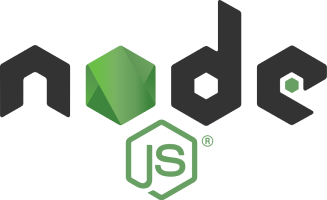



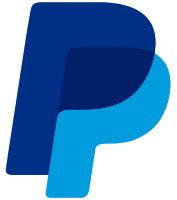
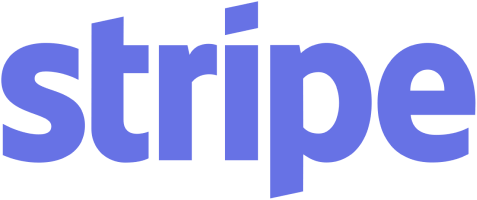

Cost to Create a Freelance Website or App like Upwork
The cost to create a website like Upwork depends on many factors such as the platform you choose, the development team you hire, what additional features you want to include, the complexity of the website or app, hours of development, etc.
Below you will find some different phases through which a website or application development project proceeds according to the specific needs of a particular business.
1. Stages of Development
i) Architecture Design
Architecture design is the most important part of the marketplace development, which will define the whole process of the development and working of the website or Application.
It includes, how many types of users your freelance marketplace website or app will have? And which functionalities will the users use on your platform?
ii) Development
Development is also defined as the implementing phase. This includes coding or writing the HTML / CSS source code according to the web standards.
iii) Database Design
Database Design & development is an integral part of the software development lifecycle. The database management system must be powerful enough to securely store the client’s information and process the requests from the users.
iv) Testing
For building a successful freelance website or app, quality assurance is very much necessary. Testing will identify system errors and missing requirements. Also, it will reduce the cost and time to produce software that is bug-free so that it is ready to deliver to the client.
v) Deployment
Once the development is complete, developers will deploy the developed freelance platform and make it accessible in the web environment.
vi) Maintenance
After the final development and deployment of the product, maintenance service is required to make the website or app work properly. Maintenance includes regularly visiting the page to make sure that it is displaying properly.
2. Average Rates of Developers
A developer may charge differently based on the expected duration of your job. Charges maybe higher for short-term contracts, while they may be less in exchange for more work flexibility and benefits.
The rates of developers may vary from the location of the country, depending on the hourly rates of development.
3. App Development Cost
Cost to Develop a Freelance Marketplace like Upwork is not accurate, it depends on many factors like developing platform, developers, complexity, additional features, development hours, etc.
i. Resources
The following resources are required for the development of any website or app.
- Project Manager
- Business Analytics
- Designer (UI/UX/HTML)
- Web /Mobile App Developers
- Tester
ii. Hours
The hourly cost varies according to the complexity of the website or application and what additional features you want to include in it.
Usually, the fee is in the range of $15 to $20 / hour depending on Developer experience.
iii. The Extra Cost
The development process will also include some extra costs for the tools that may require according to the features and functionality you want.
- Logo Design
- Domain
- Server Cost / Hosting
- Content Writing
- SSL Certificate
- 3rd party email service, SMS service, etc
4. Working with an Agency
Many business owners choose outsourcing as a way for development, especially if you want to build a freelance marketplace business model, then hiring a development company which provides a high-quality, full-cycle development service, profound expertise, and personal data protection, will be the best option.
If you can get good value for less money- why not follow the road!
Successful projects are always within the process of improvement and are gradually adding some new features that allow them to scale up.
Well if you’re thinking of developing a freelance marketplace website or app, an estimate cost would be anywhere between $5,000 - $35,000 depending on the features.
At Webs Optimization, we have experienced frontend and backend developers who will make it all work together. We provide extensively and integrated IT services that include UI/UX design, Web development, Mobile app development, and Enterprise solutions.
Conclusion
There are a lot of factors that play an important role in the success of a website or app development process. Selecting the right development company will definitely make you earn a fortune.
Therefore, all the details mentioned above will be useful for the website owners and website developers for developing a freelance marketplace website or application.
And if you still have any queries in building a freelance marketplace, reach out to us and talk to us about your requirements. Our expert team will guide you through the process of how to Develop a Freelance Marketplace like Upwork.
FAQs
Q: What is the first step to create a marketplace website?
A: The first step to create a marketplace website is to define your marketplace idea, identify your target audience, and outline the features you want to include. This foundational research is crucial for building an effective online marketplace.
Q: How do I choose the right marketplace software for my project?
A: When choosing marketplace software, consider factors such as scalability, customization options, ease of use, and the specific features you need for your online marketplace. A good marketplace builder will allow you to develop a marketplace that meets your unique requirements.
Q: Can I build an online marketplace without coding skills?
A: Yes, you can build an online marketplace without coding skills by using a no-code marketplace builder. These platforms provide user-friendly tools that allow you to create a marketplace website from scratch without needing to write code.
Q: What are the different types of online marketplaces?
A: The different types of online marketplaces include product marketplaces (like Amazon), service marketplaces (like Upwork), and rental marketplaces (like Airbnb). Understanding the type of marketplace you want to start can help you focus your development efforts.
Q: How can I launch my marketplace successfully?
A: To launch your marketplace successfully, ensure you have a solid marketing strategy in place, engage early users, gather feedback, and continuously improve your platform. A well-planned launch can significantly enhance your marketplace revenue.
Q: What features should I include in my marketplace app?
A: Essential features for a marketplace app include user registration, product listing, payment processing, user reviews, messaging systems, and an admin dashboard for managing operations. Incorporating these marketplace features will improve user experience and engagement.
Q: What is a marketplace MVP, and why is it important?
A: A marketplace MVP (Minimum Viable Product) is a basic version of your marketplace that includes only the essential features to meet the needs of early users. Building an MVP is important as it allows you to test your marketplace idea and gather feedback before investing in more extensive development.
Q: How do I determine the marketplace business model that works for me?
A: To determine the best business model, consider factors such as your target audience, the products or services offered, and your revenue goals. Popular models include commission-based, subscription-based, and listing fee models.
Q: What should I consider during the marketplace website development process?
A: During marketplace website development, consider aspects like user experience design, mobile responsiveness, website security, and SEO optimization. These elements play a crucial role in creating a successful online marketplace that attracts and retains users.
